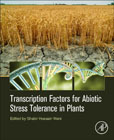
Transcription Factors for Abiotic Stress Tolerance in Plants
Wani, Shabir Hussain
Transcription Factors for Biotic and Abiotic Stress Tolerance in Plants presents the advances in understanding of the regulatory network that impacts plant health and production. Plant production worldwide is suffering serious losses due to wide spread abiotic stresses increasing as a result of global climate change. More than one abiotic stress such as extreme temperature and osmotic stress can occur at once hence increasing the complexity of these environmental stresses. Among the various categories of genes which get stimulated during abiotic stress are the regulatory proteins that further regulate the stress signal transduction and modify gene expression and thus probably function in stress response. Modern genetic engineering technologies are one of the promising tools for development of plants with efficient yields and resilience to abiotic stresses. Hence deciphering the molecular mechanisms and identifying the abiotic stress associated genes that control plant response to abiotic stresses is one of the vital requirements to develop plants with increased abiotic stress tolerance. Addressing the many complexities of transcriptional regulation, the book address cross talk and central regulation, regulatory networks, the role of DOF, WRKY and NAC transcription factors, zinc finger proteins, CRISPR/CAS9-based genome editing, C-Repeat (CRT) binding factors (CBFs)/Dehydration responsive element binding factors (DREBs) and factors impacting salt, cold and phosphorous stress levels, as well as transcriptional modulation of genes involved in nanomaterial-plant interactions. Transcription Factors for Biotic and Abiotic Stress in Plants provides a useful reference by unravelling the transcriptional regulatory networks in plants. Researchers and advanced students will find this book valuable for understanding and inspiring Discusses abiotic stress tolerance and adaptive mechanisms based on the findings generated by unlocking transcriptional regulatory networks in plantsPresents detailed information on various kinds of regulatory gene networks identified for drought, salinity, cold and heat stress in plantsWritten by international expert researchers in plant abiotic stressHighlights urgent climate change issues in plants and their management using modern biological methods, including genome editing INDICE: 1.Transcription Factors in cross talk and central regulation of plant responses to environmental stress 2.Transcription Factor regulatory networks in plant abiotic stress tolerance. 3.Role of DOF Transcription Factors in abiotic stress tolerance in crop plants. 4.WRKY Transcription factors for biotic and abiotic stress tolerance in plants 5.Zinc Finger Proteins: Novel sources of genes for abiotic stress tolerance in plants 6.NAC Transcription factor family in Rice : Recent advancements for development of stress tolerant rice 7.CRISPR/Cas9-Based Genome Editing of Transcription Factor Genes in Plants 8.Characterization of Transcription factors for drought tolerance in Maize 9.Role of stress inducible promoters for development of drought stress tolerance in plants 10.C-REPEAT (CRT) BINDING FACTORS (CBFs)/DEHYDRATION RESPONSIVE ELEMENT (DRE) BINDING FACTORS (DREBs) family in Plants 11.Major transcription factor families involved in Salinity stress tolerance in Plants 12.Role of stress inducible promoters for generating salt tolerance in plants
- ISBN: 978-0-12-819334-1
- Editorial: Academic Press
- Encuadernacion: Rústica
- Páginas: 400
- Fecha Publicación: 01/08/2020
- Nº Volúmenes: 1
- Idioma: Inglés
